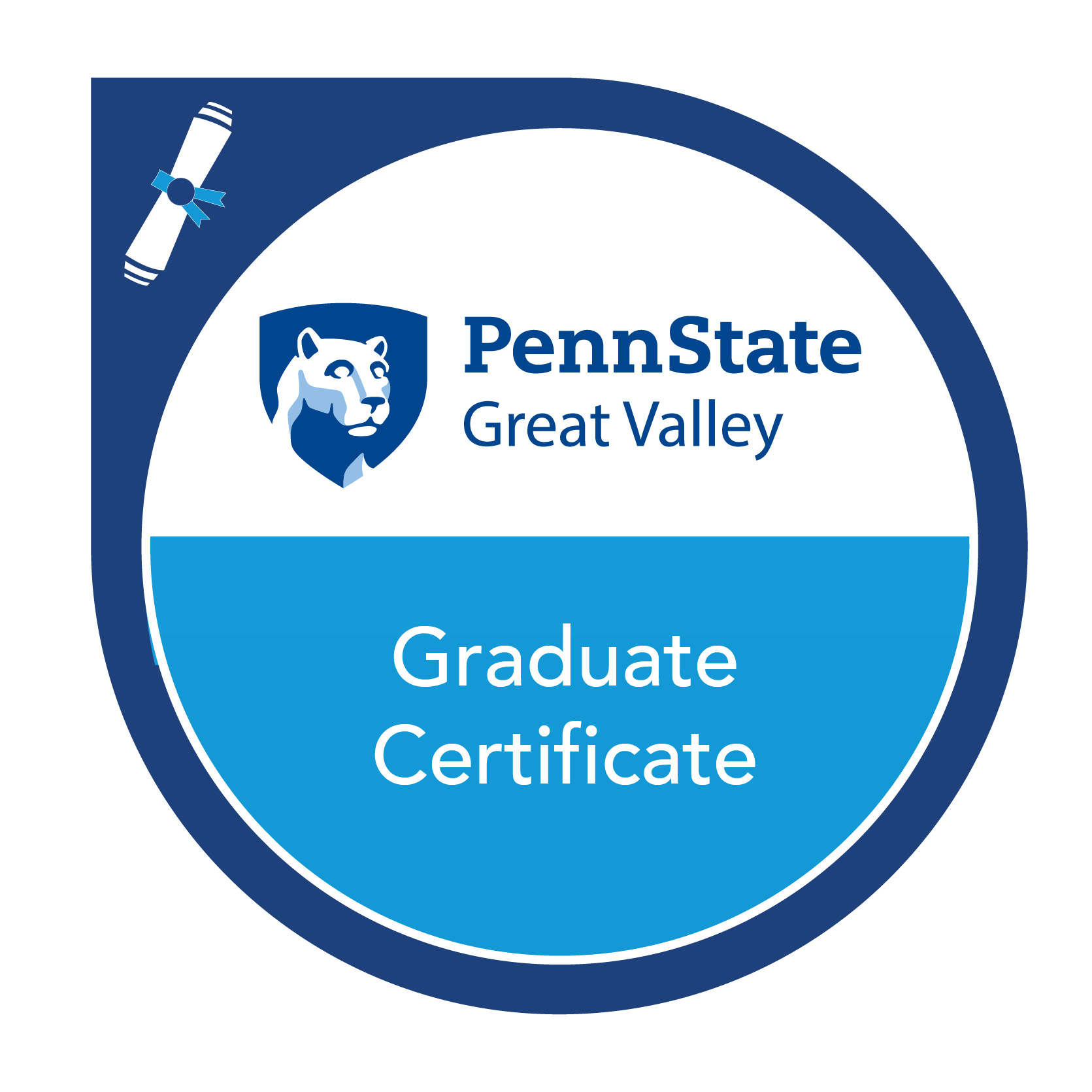100% Online
Complete your Penn State course work at your own pace and 100% online.
Application deadline
Credits and costs
Stackable Credentials
This program is embedded within the Master of Science in Information Science.
Gain IT Analytics Skills to Excel in Information Science
Build a strong foundation in network and predictive analytics principles.
Use statistical analysis software to explore the interconnected nature of cyber-social and cyber-technical dynamics, which reshape physical communities into digital realms.
Manipulate, analyze, and visualize complex data sets.
Apply data analytics techniques to solve your organization's issues using the R statistical system.
Predictive and IT Analytics Courses
Predictive and IT Analytics Courses
Gain predictive analytics skills and explore programming in Python to implement statistical, machine learning, information visualization, text analysis, and social network analysis techniques.
- 3credits
This course will explore the development of analytics systems and the application of best practices and established software design principles using the Python programming language and its several toolkits.
- 3credits
Survey course on the key topics in predictive analytics. Students will learn methods associated with data analytics techniques and apply them to real examples using the R statistical system.
- Prerequisite
STAT 500 or equivalent
- 3credits
This course will employ several methods and measures from the area of social network analysis to study the interrelatedness of cyber-social and cyber-technical aspects of an organization or the society as a whole to detect and capture the dynamic patterns of group membership and structure. This type of analysis can be useful in uncovering potential threats and attacks and predicting criminal behavior and evolution of criminal networks.
Using Certificate Credits toward a Stackable Credentials Degree Pathway
As part of the stackable pathway, the courses required for this 9-credit certificate can also be applied to a Master of Science in Information Science if you apply and are accepted into the program. If you have been accepted into this certificate program, you will not be charged an additional fee to apply for the Master of Science in Information Science program.
Courses may also apply to other degree programs. Students should contact their adviser to discuss transfer credit policies and application fees and details.
Course Availability
If you're ready to see when your courses will be offered, visit our public LionPATH course search (opens in new window) to start planning ahead.
Start or Advance Your Career

Start or Advance Your Career
You can use the knowledge gained from this program and the support of Penn State career resources to pursue careers in a variety of fields, depending on your goals.
Career Services to Set You Up for Success

From the day you're accepted as a student, you can access resources and tools provided by Penn State World Campus Career Services to further your career. These resources are beneficial whether you're searching for a job or advancing in an established career.
- Opportunities to connect with employers
- Career counselor/coach support
- Occupation and salary information
- Internships
- Graduate school resources
Ready to Learn More?
Get the resources you need to make informed decisions about your education. Request information on this program and other programs of interest by completing this form.
Ready to take the next step toward your Penn State graduate certificate?
Costs and Financial Aid
Costs and Financial Aid
Learn about this program's tuition, fees, scholarship opportunities, grants, payment options, and military benefits.
Costs and Financial Aid
Graduate Tuition
Graduate tuition is calculated based on the number of credits for which you register. Tuition is due shortly after each semester begins and rates are assessed every semester of enrollment.
2024–25 Academic Year Rates
| How many credits do you plan to take per semester? | Cost |
|---|---|
| 11 or fewer | $1,027 per credit |
| 12 or more | $12,325 per semester |
2025–26 Academic Year Rates
| How many credits do you plan to take per semester? | Cost |
|---|---|
| 11 or fewer | $1,037 per credit |
| 12 or more | $12,448 per semester |
Paying for Your Certificate
Students pursuing a certificate are considered "nondegree," a status that is not eligible for federal student aid, including the Federal Direct Stafford Loan program. A private alternative loan may be an option to consider.
Additionally, Penn State offers many ways to pay for your education, including an installment plan and third-party payments. Penn State World Campus also offers an Employer Reimbursement and Tuition Deferment Plan. Learn more about the options for paying for your education.
Students pursuing a degree and meeting all other eligibility requirements may qualify for financial aid.
Military Benefits
Military service members, veterans, and their spouses or dependents should explore these potential military education benefits and financial aid opportunities, as well.
Additional Cost of Attendance Details
To view the detailed list of cost of attendance elements:
- visit the Tuition Information site
- click the plus sign to expand the table
- select a semester from the World Campus row
Technical Requirements
Review the technical requirements for this program.
Earn Stackable Credentials on the Way to a Master's Degree

Earn Stackable Credentials on the Way to a Master's Degree
Earning graduate certificates from Penn State World Campus is a great way to gain new skills while quickly adding valuable credentials to your résumé. This certificate can serve as both a stand-alone credential and a step on your journey toward a master’s degree.
Stackable credentials recognize your newfound skills and knowledge while you work toward your degree — with no additional application fees.
This graduate certificate’s courses satisfy requirements toward the following degree:
This online information science master’s degree program can prepare you to face evolving IT challenges, including integration, security, and data analysis. You’ll also explore developing state-of-the-art IT applications and managing IT staff and projects to ensure business continuity.
Learn more about the Master of Science in Information ScienceShow Your Progress with a Digital Badge
Show Your Progress with a Digital Badge
Upon completion of this program, Penn State awards you a graduate certificate and a digital badge from Credly.

Certificate earners are awarded a digital badge for each certificate they complete as part of this stackable credentials group. Badges can be displayed digitally to recognize your accomplishment of attaining a new level of knowledge.
Finish Your Certificate in Less Than One Year

Whether you are looking to finish your program as quickly as possible or balance your studies with your busy life, Penn State World Campus can help you achieve your education goals. Many students take one or two courses per semester.
Convenient Online Format
This program's convenient online format gives you the flexibility you need to study around your busy schedule. You can skip the lengthy commute without sacrificing the quality of your education and prepare yourself for more rewarding career opportunities without leaving your home.
A Trusted Leader in Online Education

Penn State has a history of more than 100 years of distance education, and World Campus has been a leader in online learning for more than two decades. Our online learning environment offers the same quality education that our students experience on campus.
Information for Military and Veterans

Are you a member of the military, a veteran, or a military spouse? Please visit our military website for additional information regarding financial aid, transfer credits, and application instructions.
How to Apply to Penn State

How to Apply to Penn State
Apply by July 20 to start August 25
Application Instructions
Deadlines and Important Dates
Complete your application and submit all required materials by the appropriate deadline. Your deadline will depend on the semester you plan to start your courses.
Fall Deadline
Apply by July 20 to start August 25Spring Deadline
Apply by November 20 to start January 12Summer Deadline
Apply by April 20, 2026, to start May 18, 2026
Steps to Apply
For admission to the J. Jeffrey and Ann Marie Fox Graduate School, an applicant must hold either (1) a baccalaureate degree from a regionally accredited U.S. institution or (2) a tertiary (postsecondary) degree that is deemed comparable to a four-year bachelor's degree from a regionally accredited U.S. institution. This degree must be from an officially recognized degree-granting institution in the country in which it operates.
The program requires an undergraduate degree in engineering, physics, mathematics, computer science, or information science. Students from other undergraduate majors with extensive work experience in the field may be considered. The admissions committee will consider the academic background, as evidenced by the transcript, as part of the overall application.
All applicants are expected to have earned a junior/senior grade-point average of 3.0 or higher.
You will need to upload the following items as part of your application:
Official transcripts from each institution attended, regardless of the number of credits or semesters completed. Transcripts not in English must be accompanied by a certified translation. If you are a Penn State alum, you do not need to request transcripts for credits earned at Penn State but must list Penn State as part of your academic history.
GRE or GMAT — Scores are NOT required and will not be accepted.
English Proficiency — The language of instruction at Penn State is English. With some exceptions, international applicants must take and submit scores for the Test of English as a Foreign Language (TOEFL) or International English Language Testing System (IELTS). Minimum test scores and exceptions are found in the English Proficiency section on the Fox Graduate School's "Requirements for Graduate Admission" page. Visit the TOEFL website for testing information. Penn State's institutional code is 2660.
To begin the online application, you will need a Penn State account.
Create a New Penn State Account
If you have any problems during this process, contact an admissions counselor at [email protected].
Please note: Former Penn State students may not need to complete the admissions application or create a new Penn State account. Please visit our Returning Students page for instructions.
Stackable Credentials Application Fee Waiver
If you have been previously accepted to a program with stackable credentials, you will not be charged an additional application fee for any associated programs.
Associated programs in the information science stack:
Certificates
- Graduate Certificate in Business Process Integration
- Graduate Certificate in Cyber Threat Analytics and Prevention
- Graduate Certificate in IT Analytics
Degree
- Master of Science in Information Science
If you begin with a certificate and are interested in pursuing the Master of Science in Information Science, work with your adviser while completing your first certificate to determine which program to apply to next.
Up to 15 credits earned in any of these certificate programs may be transferred to the master's degree in information science, subject to restrictions outlined in GCAC-309 Transfer Credit.
You can begin your online application at any time. Your progress within the online application system will be saved as you go, allowing you to return at any point as you gather additional information and required materials.
- Choose Enrollment Type: "Certificate Admission"
- Choose "WORLD CAMPUS" as the campus
Checking Your Status
You can check the status of your application by using the same login information established for the online application form.6. Complete the application.
Admissions Help
If you have questions about the admissions process, contact an admissions counselor at [email protected].
Current Penn State students should contact [email protected] with questions and for assistance.
Contact Us

Contact Us
Have questions or want more information? We're happy to talk.
To learn more about the Graduate Certificate in IT Analytics, offered in partnership with the Penn State Great Valley School of Graduate Professional Studies, please contact:
Robin G. Qiu, Ph.D.
Professor of Information Science
[email protected]
For general questions about Penn State World Campus:
World Campus Admissions Counselors
Phone: 814-863-5386
[email protected]
Learn from the Best
Learn from the Best
The Graduate Certificate in IT Analytics is offered by Penn State World Campus in partnership with the Penn State Great Valley School of Graduate Professional Studies. Our courses are taught by distinguished faculty who have special training and experience teaching in an online environment.
Faculty
Youakim Badr
- DegreeH.D.R., University of Lyon
- DegreePh.D., Computer Science, National Institute of Applied Sciences (INSA-Lyon)
- DegreeM.S., Mathematical Modeling and Scientific Software Engineering, Francophone University Agency
- DegreeM.S., Computer Science, Lebanese University
- DegreeB.S., Computer Science, Lebanese University
Dr. Youakim Badr, professor of data analytics, teaches courses in analytics programming, analytics systems design, data mining and predictive analytics. His research interests include smart service computing, IoT, information security, big data, machine learning, and built-in analytics. Dr. Badr is a professional member of IEEE, a lifetime member of ACM, and associate member of the ACM special interest group on knowledge discovery and data mining (SIGKDD).
Adrian S. Barb
- DegreePh.D., Computer Science, University of Missouri
- DegreeMBA, Finance and Management Information Systems, University of Missouri
- DegreeB.S., Industrial Engineering, University of Bucharest
Dr. Adrian S. Barb, associate professor of information science, teaches databases, data mining, and big data courses. He has worked as a database programmer analyst as well as a web developer at University of Missouri. His research interests include data mining, knowledge discovery in databases, knowledge representation and exchange in content-based retrieval systems, semantic modeling and retrieval, conceptual change, ontology integration, and expert-in-the-loop knowledge generation and exchange.
Joanna F. DeFranco
- DegreePh.D., Computer and Information Science, New Jersey Institute of Technology
- DegreeM.S., Computer Engineering, Villanova University
- DegreeB.S., Electrical Engineering and Math, Penn State
Dr. Joanna F. DeFranco is an assistant professor of software engineering. She has worked as an electronics engineer for the Navy and as a software engineer at Motorola. Her research interests include software engineering teams, effective teamwork, Internet of Things, and software-intensive critical systems.
Phillip A. Laplante
- DegreePh.D., Computer Science, Stevens Institute of Technology
- DegreeM.B.A., University of Colorado
- DegreeM.Eng., Electrical Engineering, Stevens Institute of Technology
- DegreeB.S., Systems Planning and Management, Stevens Institute of Technology
Dr. Phillip A. Laplante is a professor of software and systems engineering. He has an extensive list of publications and deep practical experience in requirements engineering, development, testing, and project management for a variety of complex systems, including safety critical and embedded ones. He is widely recognized for work in real-time systems, real-time imaging, and applications in the Internet of Things. He is also a pioneer in licensing of software engineers, having led the development and acceptance of the first licensure exam for software engineers in the United States.
Colin Neill
- DegreePh.D., Software and Systems Engineering, University of Wales Swansea
- DegreeM.Sc., Communications Systems, University of Wales Swansea
- DegreeB.Eng., Electrical Engineering, University of Wales Swansea
Dr. Colin Neill is a professor of software engineering and systems engineering. He teaches many courses in software and systems engineering and project management. He is the author of more than 80 articles on the development and evolution of complex software and systems and their management and governance. Dr. Neill is a senior member of the IEEE and a member of INCOSE, and he serves as associate editor-in-chief of Innovations in Systems and Software Engineering.
Robin G. Qiu
- DegreePh.D., Industrial Engineering, Penn State
- DegreePh.D., (Minor), Computer Science, Penn State
- DegreeM.S., Numerical Control, Beijing Institute of Technology, China
- DegreeB.S., Mechanical Engineering, Beijing Institute of Technology, China
Dr. Robin G. Qiu is a professor of information science at Penn State. He teaches courses on data analytics, information science, software engineering, and cyber security. Dr. Qiu's research includes smart service systems, IoT, big data, data/business analytics, information systems and integration, supply chain and industrial systems, and analytics. He served as the editor-in-chief of INFORMS Service Science. He is an associate editor of IEEE Transactions on Systems, Man, and Cybernetics and IEEE Transactions on Industrial Informatics, and has more than 160 publications.
Dusan Ramljak
- DegreePh.D., Computer and Information Sciences, CST, Temple University
- DegreeM.Sc. and B.Sc., Electrical Engineering - Systems Control, University of Belgrade, Serbia
Dr. Dusan Ramljak, assistant teaching professor of information science, teaches courses on information science, data science, storage systems, and emerging technologies. He has been applying data science on storage systems in NSF IUCRC projects with HPE, Dell, Huawei, and other companies and has more than 20 years of system administration experience facilitating business and research in the U.S., Portugal, and Serbia. His research interests include solving challenging storage systems, provenance, and caching problems, and developing and integrating distributed and parallel data mining and statistical learning technology for an efficient knowledge discovery at large sequence and temporal databases.
Raghvinder S. Sangwan
- DegreePh.D., Computer and Information Sciences, Temple University
- DegreeM.S., Computer Science, West Chester University
- DegreeB.S., Genetics and Plant Breeding, Haryana Agricultural University
Dr. Raghvinder S. Sangwan is a professor of software engineering with expertise in the analysis, design, and development of large-scale, software-intensive systems and the use of AI engineering to design and develop intelligent systems that are safe, secure, and trustworthy. His research focuses on the improvement of these practices, and he has taught related courses to engineers and project managers at many prestigious academic, government, and industry organizations worldwide. Dr. Sangwan actively consults for Siemens Corporate Technology in Princeton, New Jersey, and holds a visiting scientist appointment at the Software Engineering Institute at Carnegie Mellon University in Pittsburgh, Pennsylvania. He is a distinguished contributor and senior member of IEEE and a senior member of ACM.
Satish Srinivasan
- DegreePh.D., Information Technology, University of Nebraska at Omaha
- DegreeM.S., Industrial Engineering and Management, Indian Institute of Technology, Kharagpur
- DegreeB.S., Information Technology, Bharathidasan University
Dr. Satish Srinivasan is an associate professor of information science in the engineering division at Penn State Great Valley. He teaches courses related to database design, data mining, data collection and cleaning, design and implementation of predictive analytics system, network and web securities, and business process management. His research interests include social network analysis, data mining, machine learning, big data and predictive analytics, and bioinformatics.
